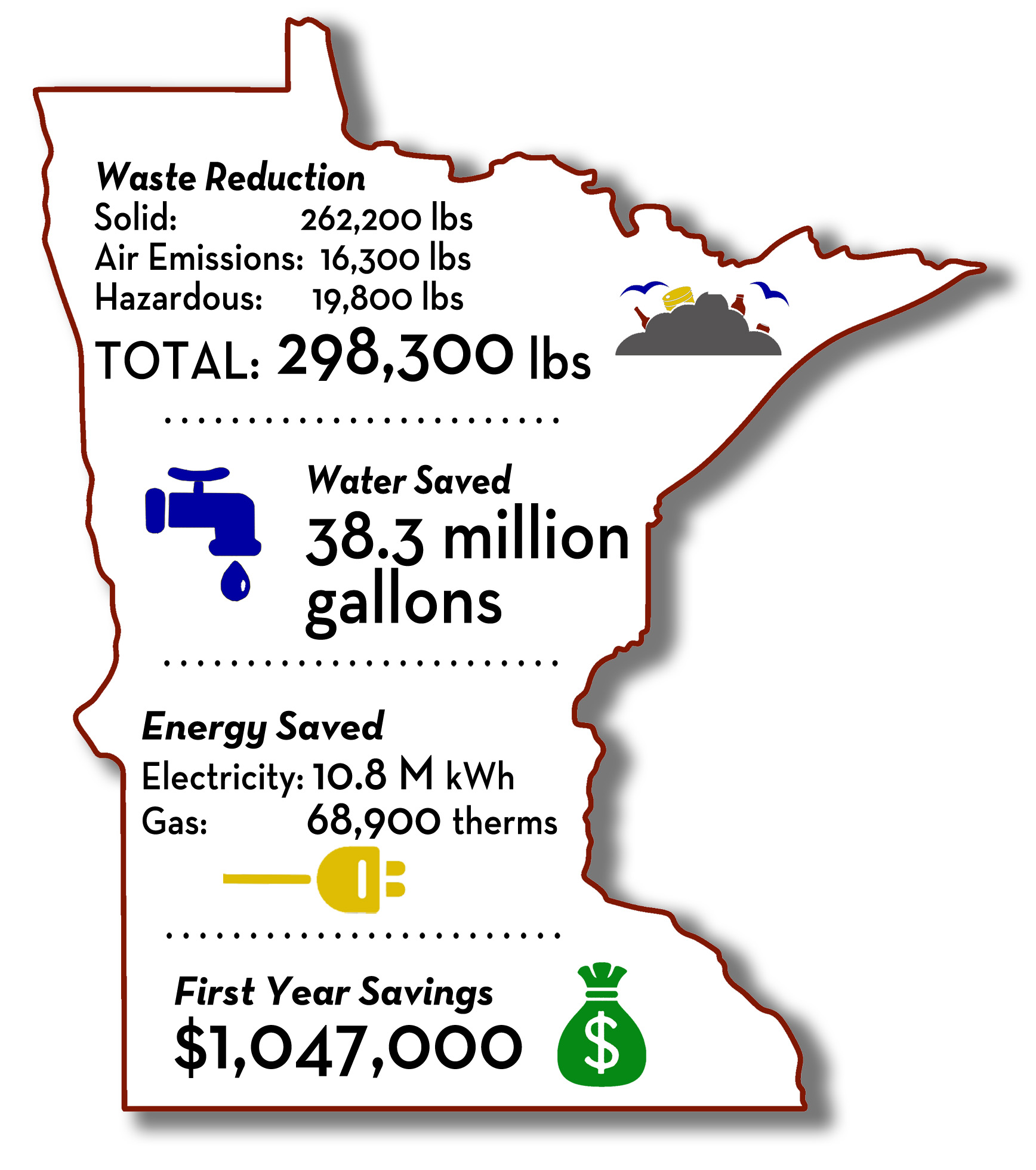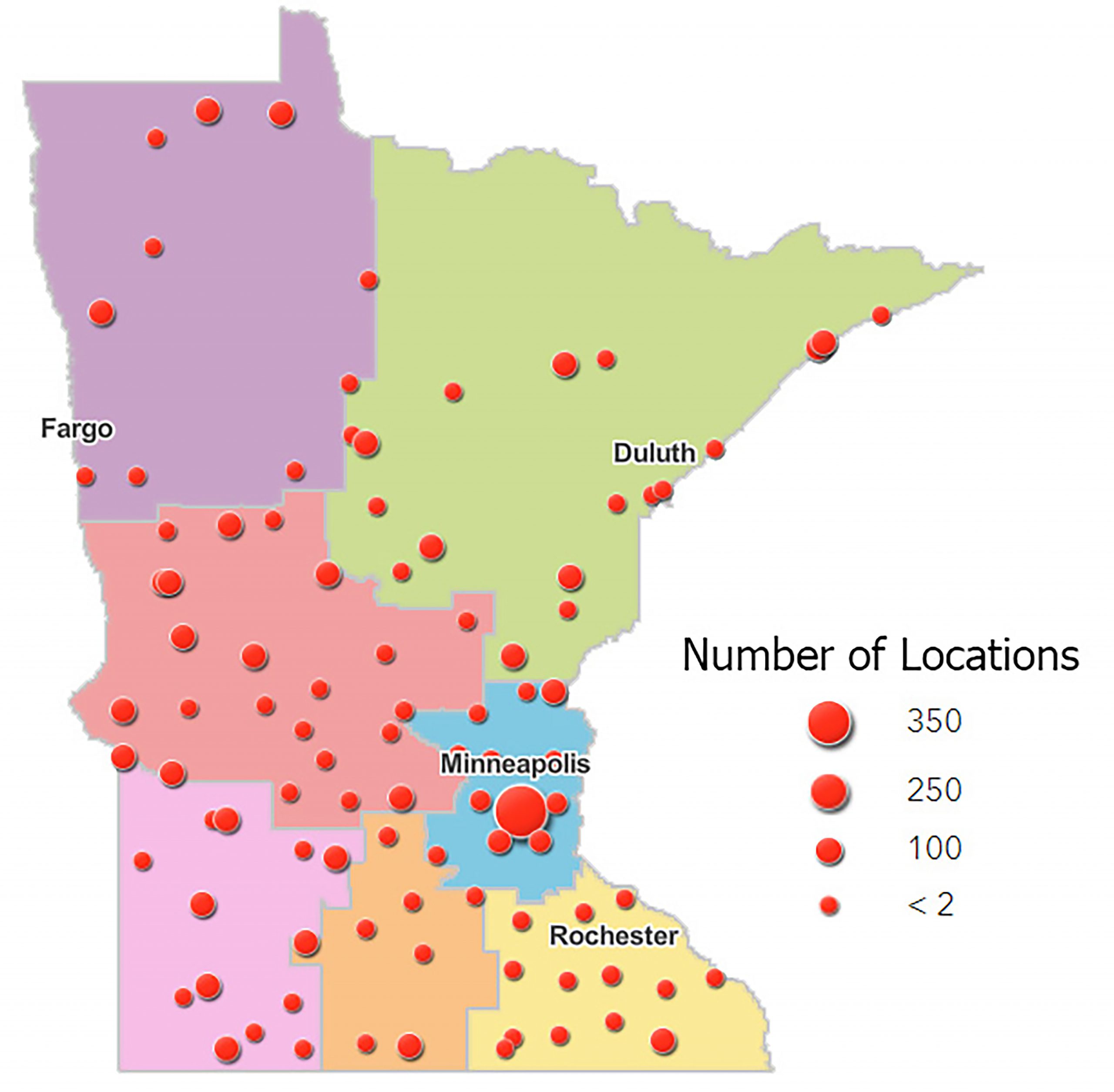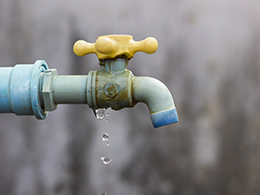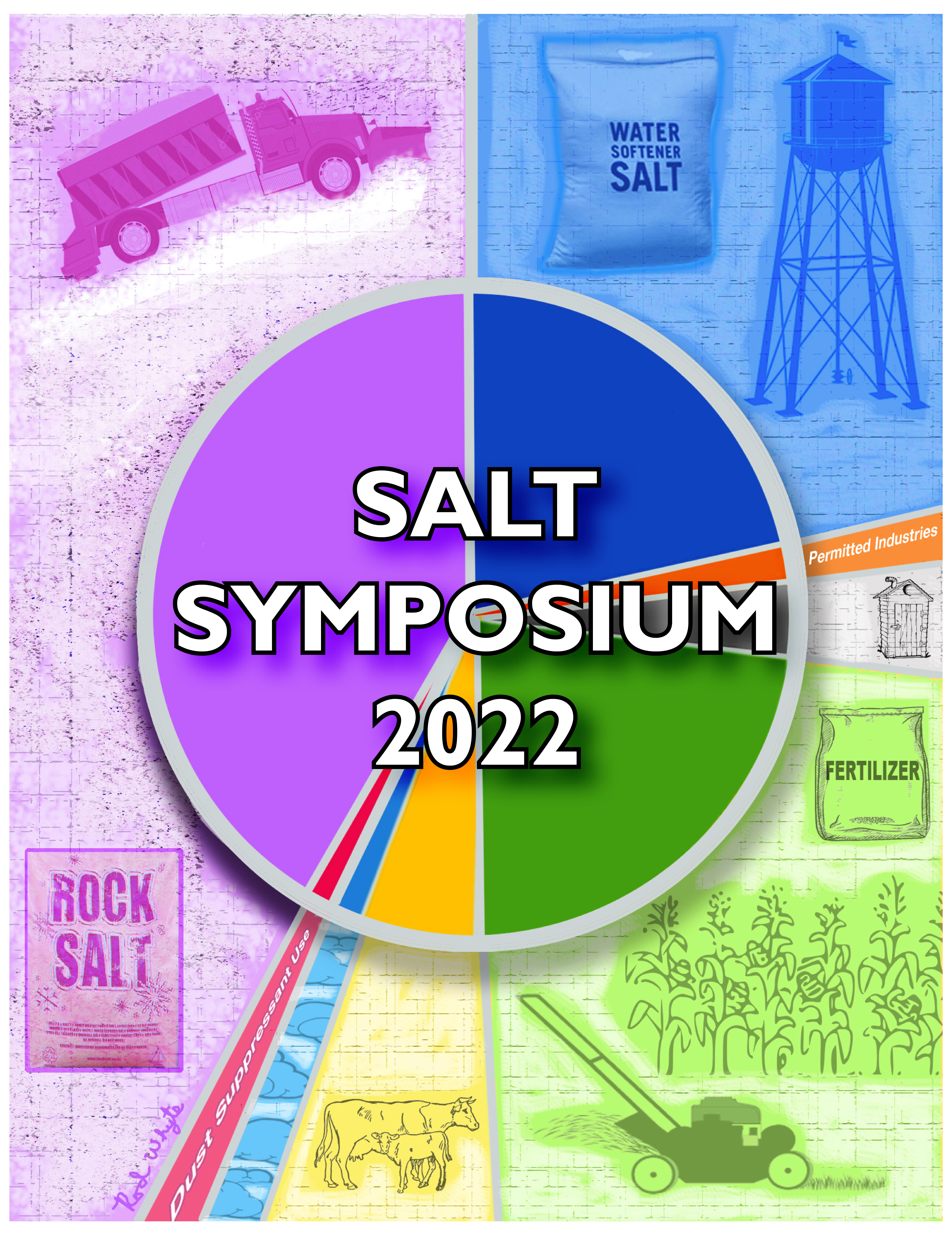June 2022 – IMPACT
Inside the Newsletter:
IMPACT 2021 | MnTAP Comtributions | Water Conservation | Metal Fabrication | Salt Symposium | Intern Symposium | Funding Opportunities
MnTAP IMPACT for Minnesota
MnTAP was again honored to collaborate with businesses and organizations across the state of Minnesota to improve environmental and economic performance by providing source reduction technical assistance. In 2021, MnTAP supported 360 organizations, provided 61 site visits, supervised 14 intern projects, and created projects for numerous student researchers. The results of our work during 2021are summarized in the 2021 MnTAP IMPACT annual report. Last year, 41 facilities implemented 64 MnTAP recommended process changes and realized reductions totaling over 38 million gallons of water, 298,300 pounds of waste, 10.8 million kWh of electric energy and 68,000 therms of fuel energy. Combined, these reductions resulted in over $1.0 million in first-year savings for participating companies.
Highlights of MnTAP’s 2021 efforts include:
- 41 facilities implemented
- 64 MnTAP recommended process changes, saving
- 38.3 million gallons of water
- 298,300 pounds of waste
- 10.8 million kWh of electric energy
- 68,900 therms of fuel energy
- $1,047,000 first-year savings.
Additional Activities Included:
- 22,000 lbs. implemented TCE reduction with 18,000 lbs. more in progress
- 1 million kWh, $87,000 wastewater facility savings by participating in energy efficiency training
- 4 financial assistance awards provided to dry cleaners eliminating the use of PERC
- New Tools and Calculators developed and posted for general use
MnTAP continues to contribute to Minnesota’s economic well-being by reducing waste at the source and training the next generation of engineers through the MnTAP Intern Program and student research projects. The 2021 IMPACT report shares stories about the wide-ranging projects MnTAP staff supported over the year. The companies and organizations engaged in these projects are making their businesses more resilient by reducing waste, optimizing processes and saving money. This is good business for Minnesota. We thank our clients, partner organizations and sponsors for the opportunity to work with them in 2021, and we look forward to serving YOUR business in 2022.
Providing Technical Assistance for All Minnesota
MnTAP continues to make the effort to provide onsite technical assistance for pollution prevention, energy efficiency and water conservation to organizations across the entire state of Minnesota. For the five-year period 2017 through 2021, MnTAP provided technical assistance for over 1,700 facilities. The economic impact of the implemented waste, water and energy source reduction projects totaled $5.4 million in first-year savings.
In addition to our intentional effort to reach out across the entire state, MnTAP supports the Minnesota Pollution Control Agency’s commitment to “ensuring that pollution does not have a disproportionate impact on any group of people” In 2021, MnTAP conducted technical assistance activities at 25 facilities located in Minnesota areas of environmental justice concern as defined by the MPCA. MnTAP will act on our commitment to provide pollution prevention technical assistance in environmental justice communities by responding quickly to requests for assistance, seeking outreach opportunities and promoting project activities that have the potential to positively impact environmental outcomes in these areas.
Industrial Water Conservation Initiatives
Implementing efficiency measures that conserve over 38 million gallons of industrial water use per year does not just happen overnight. MnTAP has been fortunate to partner with Metropolitan Council Environmental Services with funding from the Natural Resources Environmental Trust fund to support five industrial water efficiency focused intern projects per year in the metro area. During 2021 MnTAP launched an additional project to provide technical assistance focused on water conservation for industrial facilities in communities experiencing water supply challenges and is funded by the Legislative-Citizen Commission on Minnesota Resources (LCCMR).
Water efficiency projects often have additional benefits that result from a decrease in water use. Recommendations made by 2021 interns focused on water efficiency projects included 18,000 lbs of chemical use avoided, 31,000 therms of natural gas energy and 655,000 kWh of electric energy reduction. These co-benefits carry an additional $52,700 in first-year cost savings above the cost of the water itself. The cost savings from additional chemical or energy reductions associated with water efficiency can help justify investments that may be needed for full project implementation.
In 2021 a MnTAP intern created a tool to search MnTAP’s internal database of published industrial water efficiency recommendations from past intern projects. Users can search by NAICS code, implementation methods, and key words to identify industrial water conservation recommendations. Each suggestion returned in the search has a direct link to the project executive summary, which contains additional information. The industrial water efficiency tool can be accessed from the MnTAP website.
Metal Fabrication: Identifying and Sharing Best Practices
The first year of this project has focused on identifying pollution prevention priorities for the metal fabrication and precision manufacturing industries through informational interviews with practitioners, vendors and other industry stakeholders. Fabricated metal processes generate various waste streams that may be hazardous, degrade to hazardous components or require extra expense for management or compliance. Some of these streams include: oily wastes from machining operations, metals from plating baths and various metal cleaners. One goal is to share non-proprietary improvement practices throughout the industry as case studies and publications.
Most sites that were interviewed were machine shops with processes such as milling and cutting as part of their core operations; two electroplaters participated as well. Observations from information shared from sites participating in the surveys and informational interviews include the following.
60-70% of machine shops utilize water softening
100% of machine shops depend on compressed air for operations
100% of machine shops rely on coolant or metalworking fluids
100% of sites interviewed had engaged in compressed air and/or lighting energy assessments
Project Success: sharing best practices across the industry
Part of the engagement process for our project partner and participating facilities was the promise to share information broadly across the industry. MnTAP was impressed with the innovative waste reduction strategies facilities had developed in-house and requested the opportunity to share these practices through case studies. Three case studies have been shared to improve overall industry sector environmental performance.
Coolant Recycling: Lou-Rich designed and implemented a centralized coolant recycling system to significantly reduce overall coolant usage and disposal costs.
Best Practices Case Study: Lou-Rich Inc. – Coolant Recycling Program Achieves Waste Reduction
Process Efficiency: Metal Services fabricated in-house carts and utilized facility and process mapping strategies to significantly reduce forklift usage and production lead times.
Best Practices Case Study: Metal Services – Replacing Forklifts with Carts
Energy Efficiency: Jones Metal purchased a fiber laser cutter, achieving energy savings and improved throughput compared to conventional CO2 lasers.
Best Practices Case Study: Jones Metal – Switching from CO2 Lasers to Fiber Lasers
For additional information on the project and to read a recent MnTAP article published by Minnesota Precision Manufacturing Association (MPMA), visit the project page on the MnTAP website.
The second phase of this project, onsite technical assistance, has been launched. In this phase, MnTAP will utilize information learned during the informational interviews and continue to identify best practices. This work will provide site specific source reduction strategies to reduce hazardous material use, conserve energy and use water and process inputs more efficiently.
Salt Symposium 2022 – August 2-3 Online
Stay current in the chloride conversation
Salt Symposium is dedicated to increasing awareness of the effects of chloride use and inspiring changes that lead to a lower chloride future.
Topics our experts will cover during the two-day event
- Drinking water, wastewater, and water softening
- Fertilizer, soils, and erosion control
- Citizen involvement
- Winter maintenance
- Snow and ice management future concepts
View the Agenda
Save the Date! 2022 MnTAP Intern Symposium
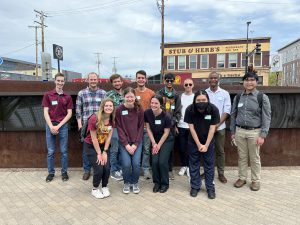 Plan to attend the 2022 MnTAP Intern Symposium scheduled for Wednesday August 17, 2022 from 12:00 – 4:30 pm CDT. This event will be streamed live from the Symposium venue at McNamara Alumni Center at the University of Minnesota. Register now and get this fun, informative event on your calendar!
Plan to attend the 2022 MnTAP Intern Symposium scheduled for Wednesday August 17, 2022 from 12:00 – 4:30 pm CDT. This event will be streamed live from the Symposium venue at McNamara Alumni Center at the University of Minnesota. Register now and get this fun, informative event on your calendar!
MnTAP is proud to host 16 interns at companies throughout the state this summer. All the interns for the 2022 MnTAP Intern Program cohort have reported to their company sites and have begun working on their projects. In three short months, these same students will have collaborated with their company hosts to scope and launch implementation of projects to use materials more efficiently, reduce waste, decrease use of hazardous materials, improve energy efficiency, and save water. This will be an inspiring afternoon that you will not want to miss!
Funding Opportunities
Dry Cleaner Cost Share Program
Minnesota has banned the use of Perchloroethylene (perc) as a dry-cleaning solvent starting in 2026. This cost share funding can help your dry-cleaning business switch away from perc.
Awards:
Up to $20,000 per applicant
Awards will be made to eligible applicant on a first come, first served basis. Early application improves the chance of funding availability.
Eligible Applicants:
Owners/operators of dry cleaning facilities in Minnesota that use or are eliminating PERC.
Eligible projects must eliminate PERC.
Application Deadline:
Monday April 1, 2024
The RFP will remain open and application accepted on a rolling basis until all dedicated funds have been dispersed, whichever comes first.
Applicants are encouraged to take advantage of matching fund opportunities such as the MPCA Small Business Loan Program which covers equipment costs up to $75,000 at 0% interest.
LEARN MOREIf you are a small dry-cleaning business owner and would like assistance applying for this grant, please contact MnTAP at 612-624-1300 or email MnTAP at mntap@umn.edu and leave your contact information.
Grants for Improving Air Quality through Pollution Reduction
MPCA is offering up to $89,000 for projects that will reduce air emissions
Maximum Grant Award:
$25,000 per applicant (see details for match requirements)
Eligible Applicants:
Businesses < 500 employees, governmental agencies, educational institutions, tribes, NGOs
Application Deadline:
Wednesday, July 27, 2022, 4:00 pm CDT
LEARN MOREIf you are a small business owner and would like assistance applying for this grant, please contact MnTAP at 612-624-1300 or email MnTAP at mntap@umn.edu and leave your contact information.
